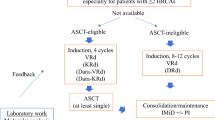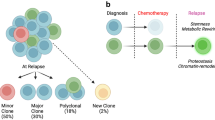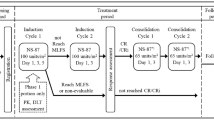Abstract
A total of 120 patients with high-risk myelodysplastic syndrome (MDS) and AML progressed from MDS (MDS–AML) were registered in a randomized controlled study of the Japan Adult Leukemia Study Group (JALSG). Untreated adult patients with high-risk MDS and MDS–AML were randomly assigned to receive either idarubicin and cytosine arabinoside (IDR/Ara-C) (Group A) or low-dose cytosine arabinoside and aclarubicin (CA) (Group B). The remission rates were 64.7% for Group A (33 of 51 evaluable cases) and 43.9% for Group B (29 out of 66 evaluable cases). The 2-year overall survival rates and disease-free survival rates were 28.1 and 26.0% for Group A, and 32.1 and 24.8% for Group B, respectively. The duration of CR was 320.6 days for Group A and 378.7 days for Group B. There were 15 patients who lived longer than 1,000 days after diagnosis: 6 and 9 patients in Groups A and B, respectively. However, among patients enrolled in this trial, intensive chemotherapy did not produce better survival than low-dose chemotherapy. In conclusion, it is necessary to introduce the first line therapy excluding the chemotherapy that can prolong survival in patients with high-risk MDS and MDS–AML.



Similar content being viewed by others
References
Mhawech P. Myelodysplastic syndrome: review of the cytogenetic and molecular data. Crit Rev Oncol/Hematol. 2001;40:229–38.
Hofmann W, Koeffler HP. Myelodysplastic syndrome. Ann Rev Med. 2005;56:1–16.
Bennett JM, Catovsky D, Daniel MT, Flandrin G, Galton DA, Gralnick HR, et al. Proposals for the classification of the myelodysplastic syndromes. Br J Haematol. 1982;51:189–99.
Finke J, Nagler A. Viewpoint: what is the role of allogeneic haematopoietic cell transplantation in the era of reduced-intensity conditioning—is there still an upper age limit? A focus on myeloid neoplasia. Leukemia. 2007;21:1357–62.
Tricot GJ. Prognostic factors in myelodysplastic syndrome. Leuk Res. 1992;16:109–15.
Nakai K, Kanda Y, Fukuhara S, Sakamaki H, Okamoto S, Kodera Y, et al. Value of chemotherapy before allogeneic hematopoietic stem cell transplantation from an HLA-identical sibling donor for myelodysplastic syndrome. Leukemia. 2005;19:396–401.
De Witte T. Stem cell transplantation for patients with myelodysplastic syndrome and secondary leukemias. Int J Hematol. 2000;72:151–6.
Cutler CS, Lee SJ, Greenberg P, Deeg HJ, Perez WS, Anasetti C, et al. A decision analysis of allogeneic bone marrow transplantation for the myelodysplastic syndrome: delayed transplantation for low risk myelodysplasia is associated with improved outcome. Blood. 2004;104:579–85.
Oran B, Giralt S, Saliba R, Hosing C, Popat U, Khouri I, et al. Allogeneic hematopoietic stem cell transplantation for the treatment of high-risk acute myelogenous leukemia and myelodysplastic syndrome using reduced-intensity conditioning with fludarabine and melphalan. Biol Blood Marrow Transplant. 2007;13:454–62.
Lekakis L, de Lima M. Reduced-intensity conditioning and allogeneic hematopoietic stem cell transplantation for acute myeloid leukemia. Expert Rev Anticancer Ther. 2008;8:785–98.
Denzlinger C, Bowen D, Benz D, Gelly K, Brugger W, Kanz L. Low-dose melphalan induces favourable responses in elderly patients with high-risk myelodysplastic syndromes or secondary acute leukaemia. Br J Haematol. 2000;108:93–5.
Miller KB, Kim K, Morrison FS, Winter JN, Bennett JM, Neiman RS, et al. The evaluation of low-dose cytarabine in the treatment of myelodysplastic syndrome. Ann Hematol. 1992;65:162–8.
Okamoto T, Kanamaru A, Shimazaki C, Motoji T, Takemoto Y, Takahashi M, et al. Combination chemotherapy with risk factor-adjusted dose attenuation for high-risk myelodysplastic syndrome and resulting leukemia in the multicenter study of the Japan Adult Leukemia Study Group (JALSG): results of an interim analysis. Int J Hematol. 2000;72:200–5.
Greenberg P, Cox C, LeBeau MM, Fenaux C, Morel P, Sanz G, et al. International scoring system for evaluating progenitors in myelodysplastic syndrome. Blood. 1997;89:2079–88.
Yamada K, Furusawa S, Saito K, Waga K, Koike T, Arimura H, et al. Concurrent use of granulocyte colony-stimulating factor with low-dose cytosine arabinoside and aclarubicin for previously treated acute myelogenous leukemia: a pilot study. Leukemia. 1995;9:10–4.
Miller AB, Hoogstraten B, Staquet M, Winkler A. Reporting results of cancer treatment. Cancer. 1981;47:207–14.
Alessandrino EP, Della Porta MG, Bacigalupo A, Van Lint MT, Falda M, Onida F, et al. WHO classification and WPSS predict post-transplantation outcome in patients with myelodysplastic syndrome: a study from the Gruppo Italiano Trapianto di Midollo Osseo (GITMO). Blood. 2008;112:895–902.
Nachtkamp K, Kundgen A, Strupp C, Giagounidis A, Kobbe G, Gattermann N, et al. Impact on survival of different treatments for myelodysplastic syndromes (MDS). Leuk Res. 2009;33:1024–8.
Ooi J. The efficacy of unrelated cord blood transplantation for adult myelodysplastic syndrome. Leuk Lymphoma. 2006;47:599–602.
Knipp S, Hildebrand B, Kundgen A, Giagounidis A, Kobbe G, Haas R, et al. Intensive chemotherapy is not recommended for patients aged >60 years who have myelodysplastic syndromes or acute myeloid leukemia with high-risk karyotypes. Cancer. 2007;110:345–51.
Fenaux P, Mufti GJ, Hellstrom-Lindberg E, Santini V, Finelli C, Giagounidis A, et al. Efficacy of azacitidine compared with that of conventional care regimens in the treatment of higher-risk myelodysplastic syndromes: a randomized, open-rabell, phase III study. Lancet Oncol. 2009;10:223–32.
Acknowledgments
We would like to thank the participating physicians in the Japan Adult Leukemia Study Group (JALSG) MDS200 study for their cooperation. This work was supported in part by grants-in-aid for Scientific Research from the Japanese Ministry of Education, Culture, Sport, Science, and Technology, and grants-in-aid for Cancer Research from the Japanese Ministry of Health, Labor, and Welfare.
Author information
Authors and Affiliations
Corresponding author
Additional information
For the Japan Adult Leukemia Study Group.
About this article
Cite this article
Morita, Y., Kanamaru, A., Miyazaki, Y. et al. Comparative analysis of remission induction therapy for high-risk MDS and AML progressed from MDS in the MDS200 study of Japan Adult Leukemia Study Group. Int J Hematol 91, 97–103 (2010). https://doi.org/10.1007/s12185-009-0473-4
Received:
Revised:
Accepted:
Published:
Issue Date:
DOI: https://doi.org/10.1007/s12185-009-0473-4




